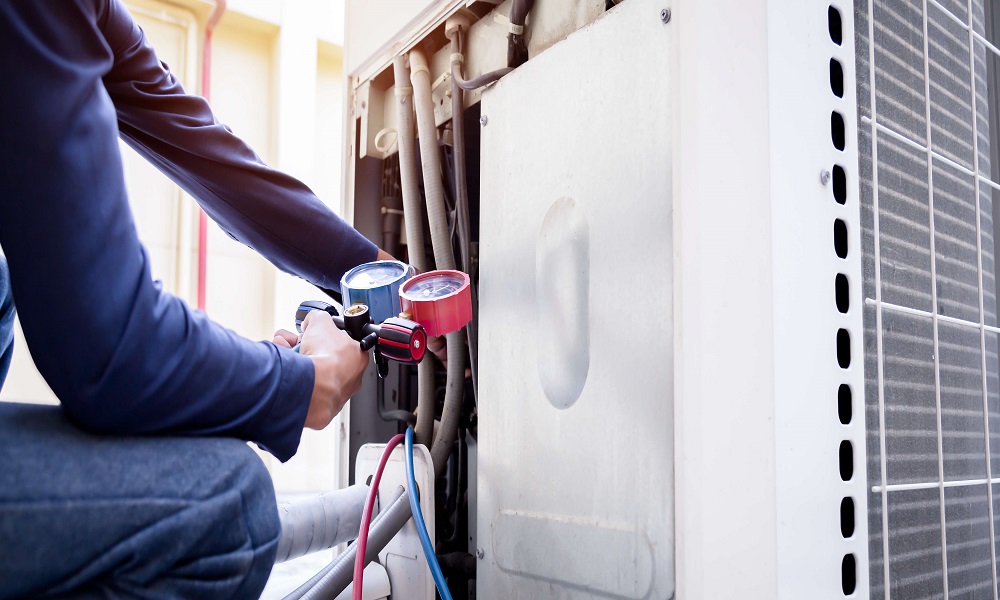Reliable Team at DMAKS HVAC for Complete Comfort.
Reliable Team at DMAKS HVAC for Complete Comfort.
Blog Article
Energy-Efficient HVAC Solutions to Save on Utility Costs
As energy prices remain to rise, the value of energy-efficient heating and cooling systems ends up being significantly obvious. These systems not just assure significant financial savings on energy bills but additionally add to a more sustainable future by decreasing power usage. With different alternatives readily available, consisting of geothermal heatpump and ductless mini-splits, building proprietors deal with a wide variety of selections that can boost convenience and air high quality. Comprehending the crucial features and upkeep requirements is important to making best use of these advantages. What aspects should be prioritized when selecting the appropriate system for your demands?
Advantages of Energy-Efficient A/c Solutions
Energy-efficient cooling and heating systems supply countless benefits that expand beyond plain expense financial savings. One considerable benefit is the lowered environmental influence. By eating much less power, these systems add to lower greenhouse gas exhausts, assisting to deal with climate adjustment and advertise sustainability. This lines up with enhancing societal demands for green methods in property and business setups.
Furthermore, energy-efficient heating and cooling systems usually provide boosted convenience degrees. A number of these systems feature innovative modern technology that enables for better temperature control and enhanced air quality (DMAKS HVAC). This leads to a much healthier indoor environment, which is especially important for individuals with allergic reactions or breathing concerns
Furthermore, buying energy-efficient cooling and heating systems can improve residential or commercial property worth. As even more consumers focus on energy performance, homes and structures furnished with these systems may draw in higher quotes in the property market.
Kinds of Energy-Efficient HVAC Options
Just how can property owners and companies select one of the most ideal energy-efficient cooling and heating choices for their needs? The market provides a range of energy-efficient cooling and heating systems, each developed to improve convenience while decreasing energy consumption.
One choice is the variable refrigerant circulation (VRF) system, which efficiently controls the temperature in several areas within a structure. This system adjusts its cooling agent flow to match the wanted temperature level, resulting in significant energy savings.
An additional popular option is geothermal warm pumps, which make use of the earth's stable temperature level to warm and cool rooms. By moving warmth to and from the ground, these systems show excellent performance, particularly in moderate climates.
Furthermore, ductless mini-split systems offer an energy-efficient alternative for homes doing not have ductwork. These systems enable zone-specific cooling and heating, reducing power waste in empty locations.
Finally, high-efficiency furnaces and ac unit, with sophisticated SEER and AFUE ratings, use trusted environment control while taking in less power than typical designs. By examining these alternatives, house owners and businesses can select a HVAC system customized to their details demands and power efficiency objectives.
Secret Functions to Consider

Next, investigate the kind of compressor used in the system. DMAKS HVAC. Variable-speed compressors can change their result to match the heating or cooling need, causing enhanced comfort and energy cost savings compared to single-speed versions. Furthermore, seek systems geared up with smart thermostats that offer programmable settings and remote accessibility, enabling much better control over energy intake
One more vital feature is the system's air filtering ability. High-efficiency filters can boost indoor air top quality and reduce power intake by making sure the system operates successfully. Take into consideration the type of cooling agent used; contemporary systems commonly utilize eco-friendly refrigerants that have a lower ecological impact.
Finally, make certain that the system works with zoning technology, which permits tailored temperature control in various areas of your home, enhancing convenience while decreasing power usage.
Tips for Picking the Right System


Next, think about power performance ratings, specifically recommended you read the Seasonal Power Effectiveness Ratio (SEER) for cooling down systems and the Yearly Fuel Utilization Performance (AFUE) for furnace. Higher ratings show better effectiveness, which can bring about significant financial savings on utility costs over time.
In addition, assess the type of HVAC system that best fits your lifestyle and spending plan. Choices include central air, ductless mini-splits, and heatpump, each with its own collection of benefits and downsides.
Don't forget the importance of proper setup and sizing; an improperly sized system can cause ineffectiveness and boosted wear. Last but not least, seek advice from with a specialist a/c service provider to obtain expert suggestions tailored to your home's unique demands. This thorough approach will certainly make certain that you pick an energy-efficient a/c system that satisfies your demands and budget effectively.
Upkeep for Optimal Performance
When the right cooling and heating system remains in location, ongoing maintenance ends up being vital to ensuring optimal effectiveness and durability. A well-maintained system runs better, causing lower energy usage and lowered utility bills. Routine evaluations and tune-ups need to be set up at the very least two times a year-- as soon as prior to the air conditioning period and when prior to the heating season.

Homeowners must likewise be attentive regarding checking their cooling and heating system's efficiency. Unusual noises, rising and fall temperatures, or boosted energy costs can suggest underlying problems that require instant interest. By dealing with these issues immediately, homeowners can stop pricey fixings and extend the life-span of their systems.
Investing in an upkeep plan with a qualified technician not only enhances effectiveness but likewise provides assurance, understanding that the system is running at its ideal. DMAKS HVAC. Normal maintenance is consequently important for maintaining power effectiveness and decreasing total operational prices
Verdict
To conclude, energy-efficient a/c systems provide view a feasible solution see it here for reducing energy expenses while boosting comfort and air high quality. By integrating innovative modern technologies and alternatives such as geothermal heat pumps and ductless mini-splits, building owners can achieve significant energy savings and add to ecological sustainability. Mindful consideration of system functions and recurring maintenance additionally guarantees ideal performance, making energy-efficient systems a sensible investment for both financial and ecological benefits.
Report this page